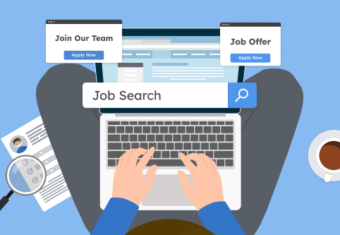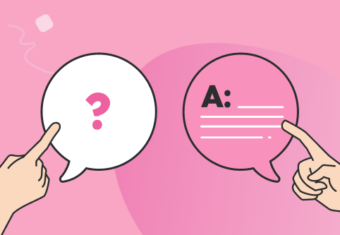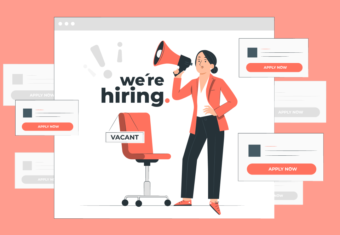Preparing insightful questions to ask at the end of an interview should never be an afterthought.
Asking questions not only shows the interviewer that you’re interested in the job, it also gives you an opportunity to learn whether the company aligns with your values and provides you with the best opportunity to grow.
Below are the top 8 interview questions designed to not only express your enthusiasm and initiative to prospective employers but also critically assess if a company is the right fit for you:
1. How has your company adapted to recent industry changes or trends?
Showing interviewers that you’re aware of industry trends indicates that you stay up-to-date on information relevant to your career and that you’re capable of adapting to changes.
Additionally, an interviewer’s response to this question can give you a lot of information about how adaptable or cutting-edge the company is.
By inquiring about how a company adapts to trends, especially in areas like AI, you can position yourself as a candidate who’s not only aware of industry shifts but also prepared to navigate them effectively.
Listen closely to how the company has adapted. In follow-up conversations, make a connection between the strategies being implemented by the company and how your skills can support and enhance the company as it evolves.
2. What two or three qualities define a top performer at your company?
Asking this question signals your ambition to join the team and excel in it.
By understanding what makes a top performer, you’ll get a sneak peek into the core values and behaviors your potential employer cares about — and what you could potentially do well at if hired.
Also, specifying two or three qualities helps keep your interviewer’s answer focused and gives you a clearer sense of what’s essential for the role.
Use the insights you learn from this question as a springboard for deeper conversation, such as asking specifically about company success metrics and previous or ongoing initiatives. For instance, if a critical trait is “innovation,” try asking the follow-up question: “Could you share an example of a project where a team member’s innovation benefited the company?”
Continuing the dialogue will not only show that you’re enthusiastic and engaged but also provide you with more valuable information about the company’s expectations and how they evaluate performance.
3. How does your company foster professional development and career growth?
During an interview, you’re probably just focused on securing the job, but it’s also necessary to think about your future career trajectory. Can this company be a step forward in your career?
Asking this question will help give you the information you need to decide whether the job you’re interviewing for supports your long-term goals.
According to LinkedIn’s 2023 Workforce Learning report, employees prioritize “progress toward career goals” as their top motivation to learn.
By demonstrating a long-term career vision during interviews, you position yourself as ambitious and dedicated.
Beyond job titles and promotions, gauge a company’s commitment to skill enhancement, networking opportunities, and exposure to a variety of roles or tasks.
4. Can you share more about the specific team that I’d be working with if hired?
This question is a great way for you to find out if your skills will complement or enhance the existing team.
After learning more about the hard and soft skills or interpersonal dynamics of your potential coworkers, you’ll have the opportunity to highlight any of your skills that could bridge a gap or provide additional support.
With teamwork, communication, and critical thinking showing up as some of the most in-demand skills of 2023, familiarizing yourself with your team’s dynamics beforehand will help you onboard smoothly and promote a collaborative and productive work environment.
Take this opportunity to learn more about the team’s communication style. Consider asking a follow-up question like: “How does the team usually communicate and collaborate on projects?” to help you find out about their meeting norms and specific communication tools.
5. What do you think is the most challenging aspect of this job?
Asking about potential challenges in the role gives you a heads-up about any issues or red flags that might turn you off from the company.
Plus, it’s a chance for you to show off your transferable skills by discussing any relevant experiences you have dealing with a similar challenge.
Try sharing a brief, structured example using the Situation, Task, Action, Result (STAR) method about how you’ve overcome a similar challenge in the past. Providing a relatable example can show your interviewer that you’ll be able to transfer what you’ve previously learned and apply it to this new role.
6. Can you describe the company’s culture and core values?
Finding a company whose culture aligns with your values is essential for job satisfaction and long-term success. By asking about culture, you’re not just looking to fit in, but to thrive and contribute meaningfully.
For example, feeling recognized and valued is crucial for many employees. A 2023 Gallup survey found that when employees feel recognized, seven in 10 of those workers feel a strong connection to their company’s culture.
On the flip side, a recent McKinsey survey highlighted reasons employees leave jobs: feeling overlooked by leaders, seeing limited growth opportunities, and not finding their tasks meaningful. These are critical factors to consider when evaluating a potential employer.
When a company emphasizes values like recognition or flexibility, reflect on their significance to you. Being in sync with a company’s culture can make a big difference in how committed and engaged you feel.
7. What do you personally enjoy about working here?
Asking the interviewer about their own experiences offers a unique window into the company’s culture. It not only fosters a personal connection and keeps the conversation positive, but also gives you genuine, firsthand insights.
Geoffrey Scott, Hiring Manager and Career Expert at Resume Genius, says:
“A candidate’s curiosity about my personal journey or individual experiences within the company speaks to their commitment to building meaningful relationships. It’s a refreshing approach that I always love to see.”
As Scott puts it, this question showcases your genuine interest toward people in the organization and speaks to the value you place on interpersonal connections and team dynamics.
Pay close attention to the stories and feelings being shared. Then, engage with their response by sharing a relatable experience or expressing genuine interest and curiosity. Building rapport through an interaction like this one can strengthen your connection with the interviewer and leave a lasting impression.
8. Could you share a piece of career advice based on our conversation today?
Asking this question not only showcases your eagerness to grow as a professional but also creates a memorable moment with the interviewer.
It’s different from standard interview queries because you’re emphasizing broader career aspirations and showing that you value the interviewer’s personal insights.
Politely requesting for advice is a testament to one’s commitment to personal and professional development. According to Scott:
The best candidates are hands down those who are always eager to learn and grow. Asking for career advice shows me this applicant is bold but humble, looking for knowledge, and proactive in their approach.
– Geoffrey Scott, Hiring Manager and Career Expert at Resume Genius
Even if you’re a seasoned professional, this question highlights your commitment to continuous learning and valuing diverse viewpoints.
Always express genuine gratitude for any advice you receive. In future interactions and your thank you letter, reference this advice to show you’re an active listener and will reflect on the interviewer’s insights.
Sources
- Gallup, “Empowering Workplace Culture Through Recognition”
- LinkedIn, “2023 Workplace Learning Report”
- McKinsey, “The Great Attrition is Making Hiring Harder. Are You Searching the Right Talent Pools?”
- Resume Genius, “1 in 4 Workers Prefer Interacting with AI Instead of Humans”
- Resume Genius, “Communication Named #1 Soft Skill in AI-influenced Workplace”
About Resume Genius
Since 2009, Resume Genius has combined innovative technology with leading industry expertise to simplify the job hunt for people of all backgrounds and levels of experience.
Resume Genius’s easy-to-use resume builder and wide range of free career resources, including resume templates, cover letter samples, and resume writing guides, help job seekers find fulfilling work and reach their career goals. Resume Genius is led by a team of dedicated career advisors and HR experts and has been featured in The New York Times, Forbes, CNBC, and Business Insider.
For media inquiries, please contact us.
Click to rate this article
4.5 Average rating

















